NYC’s Forgotten ‘War on Christmas Trees’
Discover how an obscure holiday crackdown affects festive street vendors today!


New York City may have once had a natural coastline but it was primarily marshland. Today, with continued human intervention on the landscape of the New York City waterfront, you can find some great beaches, albeit man-made. From Governors Island to Brooklyn Bridge Park, and two under-the-radar spots in the Bronx, here are seven man-made beaches to check out:
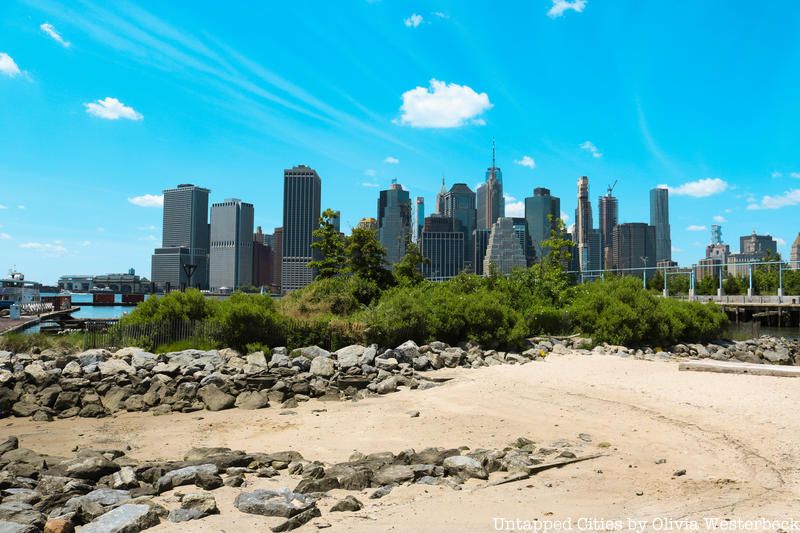
You can’t go into the water at the beach in Brooklyn Bridge Park, but it’s still a great addition to the Brooklyn Heights waterfront. The beach at Pier 4 is built out of the remnants of a railroad float transfer bridge that collapsed into the East River. The park built the beach as a protected habitat preserve the includes Bird Island, just off shore. As the Brooklyn Bridge Park Conservancy writes, “The beach design incorporates innovative structures designed by ECOncrete to mimic natural tidal pools typically found along rocky coasts.” More of these pool are located on Bird Island. If you’re curious what Pier 4 Beach looked like before its redesign, check out these before and after photos of Brooklyn Bridge Park.
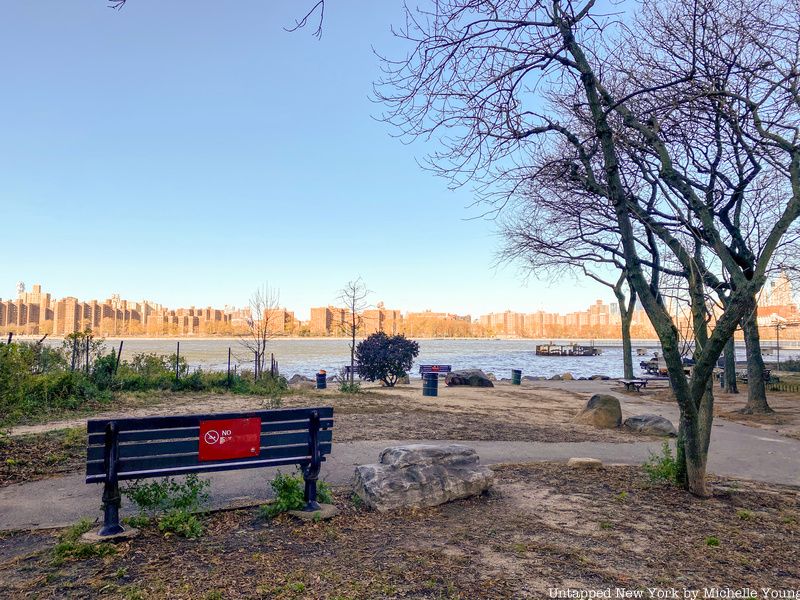
Grand Ferry Park in South Williamsburg, Brooklyn is like a little slice of the beach on the East River, complete with sand! In addition to the great views of Manhattan, there’s a charming little door at the base of the smokestack (which formerly serviced a Pfizer factory) etched with some park facts. The name of the park comes from a ferry service, the Grand Street Ferry, established in 1802 by one of Williamsburg’s early notable figures, Richard Woodhull, that went from this point on Metropolitan Avenue to Corlear’s Hook on the Lower East Side. The ferry went out of business in 1918 and the land turned into an unofficial park using recycled materials in 1974, according to the New York City Parks Department.
Grand Ferry Park officially opened in 1998, after the land was transferred to the parks department and a second renovation was completed in 2008. When the Domino Sugar Factory redevelopment is completed, Grand Ferry Park will be connected to a long waterfront esplanade, along a new street that has yet to be built – River Street.
The southern part of Governors Island (the cone of the ice cream cone) was made from landfill that came out of the excavation of the Lexington Avenue subway (4/5/6 lines) in 1912. 4,787,000 cubic yards of fill were used to add 103 acres to Governors Island. There was 175,000 cubic yards of fill added to create the first section of the new park that opened in 2014, and 297,000 additional cubic yards added to make The Hills. In total, 472,000 cubic yards of fill were added for both phases of the new park, which would fill the main concourse of Grand Central Terminal three times (with fill left over still) or a line of 1600 subway cars stretching from Yonkers to Battery Park.
However, the beach at the Governors Club is on the historic, original portion of the island. The website of the Governors Club claims that it is the only “only man-made beach and outdoor beer garden in New York City.” In practice, most people will know it as a popular concert venue. The beach was formerly part of a program of beaches known as the “Water Taxi beaches” (some may remember the one on Hunters Point South, in Long Island City that closed in 2011 or the one at South Street Seaport).
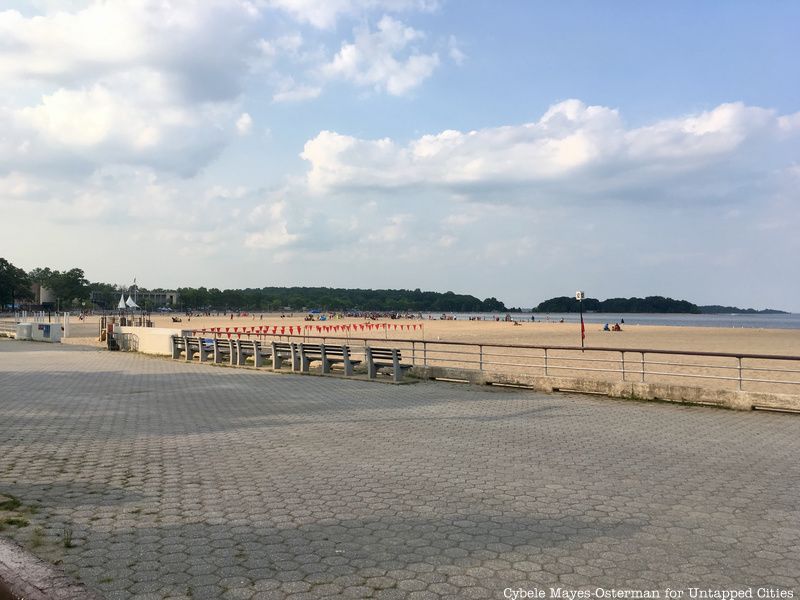
In the 20th century, Parks Commissioner Robert Moses carried out a number of outdoor public projects to promote the beautification and betterment of New York City. One such project was the man-made Orchard Beach, which Moses planned as part of Pelham Bay Park. The Orchard Beach Project cost approximately $8 million and included an accompanying parking lot and 90,000 square foot bathhouse complex. The “landfill-fortified beach” was extended by 1.25 miles by filling in the water in LeRoy’s Bay with fill from Sandy Hook, New Jersey and the Rockaways. Two former islands, Twin Island and Hunter’s Island, in Pelham Bay are no longer separate but part of the Bronx. “The Riviera of the Bronx” opened in 1936 and remains the only public beach in the borough.
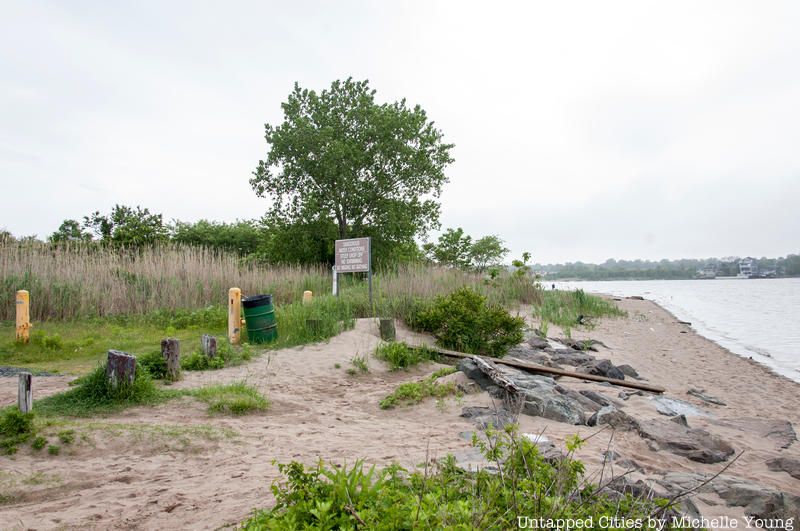
Crooke’s Point is part of Great Kills Park, the end of a narrow strip of land that forms Great Kills Harbor on Staten Island. Currently undergoing habitat restoration and environmental cleanup, it’s a great spot for birding and other natural wildlife observation. There’s a sandy beach that’s partially man-made, and you can get quite close to the tip of the point by car, leaving it at the osprey viewing platform. The National Park Service also allows people to apply for a nature study permit. Crooke’s Point is named after a naturalist and businessman who owned a house here in the 19th century. The bay is man-made formed by dredging and connecting Crooke’s Point, which was previously an island.
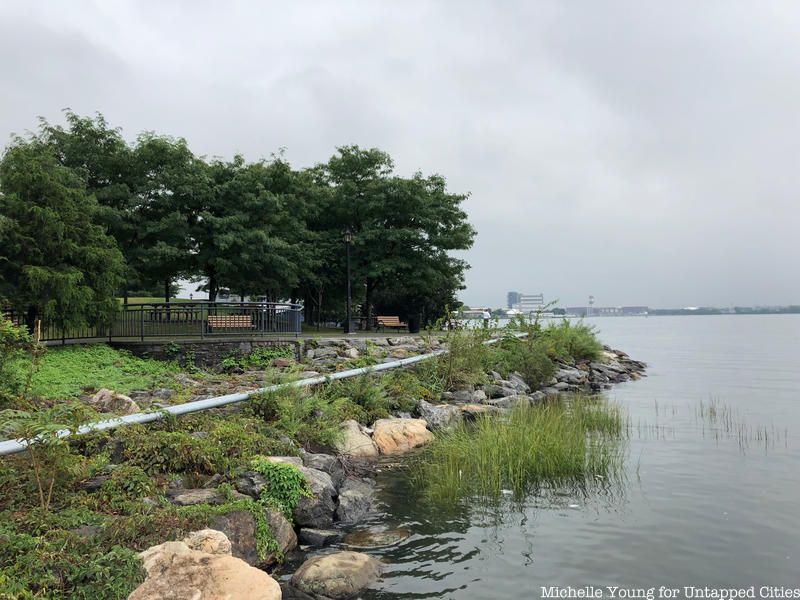
Also on Hunts Point in the Bronx is the Barretto Point Park, an open space that features the floating barge pool on the East River and a view of North Brother Island. There’s a nice Roman style seating area, a sandy beach, paved roads for biking, playgrounds, benches by the waterfront, and more. The park is named after Francis J. Barretto, one of the wealthy merchants who lived in Hunts Point when it was filled with grand estates.
The land was acquired by the New York City Parks Department in 2001 from the Department of Environmental Protection. The park cost $7.2 million and was created through the addition of landfill onto a property that once contained an asphalt plant and other industrial properties. Like Fresh Kills Park, the land was capped as part of an environmental remediation process.
This vintage photograph from 1982 is a reminder not only for what has been lost, but also that urban geography is always changing. In 1982, the World Trade Center complex was not completed yet, and certainly not Battery Park City, most of which was built in the ’80s. The World Financial Center was completed in 1985. The “beach” you see here is from the excavations to build the World Trade Center.
Next, check out the history of the beach at Dead Horse Bay in Brooklyn, discover a hidden natural sandy beach in Inwood or check out 10 man-made places in NYC.
Subscribe to our newsletter